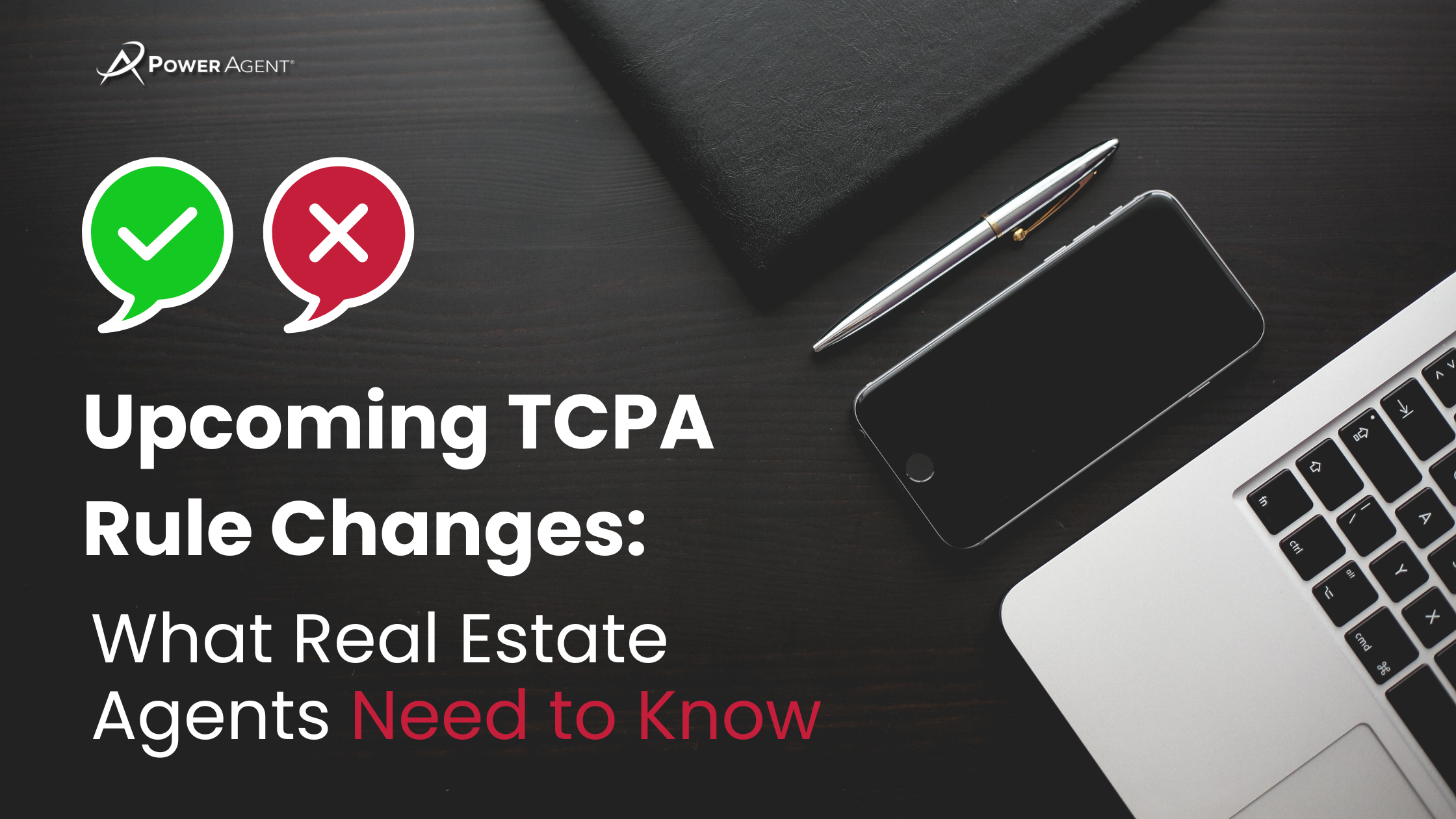
Upcoming TCPA Rule Changes: What Real Estate Agents Need to Know
Stay compliant with new TCPA rules: tighter consent, stricter lead rules, and big fines. Manual calls are safe; written consent is key for auto-dialers.
If you’re a real estate agent who relies on phone calls to FSBOs, expired listings, or even good old-fashioned neighborhood cold calls, you need to know that the TCPA (Telephone Consumer Protection Act) is getting a serious update on January 27, 2025. These changes aim to tighten up the rules around telemarketing, especially when it comes to how you obtain consent and communicate with potential clients. To keep you on the right side of the law — and avoid some hefty fines — here’s a breakdown of what’s changing and how it impacts you.
One-to-One Consent Rule
-
- What it means: If you want to call, text, or drop a prerecorded message using an auto-dialer, you must get specific consent from that person, for your business only.
-
- Before: You could get a list of leads with blanket permissions, like “Sure, anyone can call me.” Not anymore.
-
- Now: Each person has to give their okay just for you. No shortcuts.
Consent Revocation Made Easy
-
- What it means: If someone doesn’t want to hear from you anymore, they can say “stop” however they want — text, email, smoke signal, whatever — and you MUST honor it within 10 business days.
-
- Before: You might’ve been able to claim, “Oh, we didn’t see your opt-out request” to get extra time to contact them.
-
- Now: Stay on top of revocations, or you’ll be paying big fines.
Tighter Rules on Lead Generation
-
- What it means: If you’re buying leads, don’t just assume they’re cool with you calling or texting them. We all know what “assuming” does! They have to have said yes specifically to your business.
-
- Before: Lead companies could sell you generic “interested people” lists.
-
- Now: Nope. If they didn’t agree to you contacting them directly, don’t touch that phone.
Rules on Automated Calls & Prerecorded Messages
-
- What it means: Auto-dialers and prerecorded voicemails are basically off-limits unless you’ve got written consent from the person.
-
- Before: You had been able to slide by with broad consents.
-
- Now: Manual dialing is the safer route unless you have all the legal permissions squared away.
Do Not Call List (DNC) Compliance
-
- What it means: If someone’s on the DNC list, don’t call them. Like, just don’t. Exceptions only apply if you’ve got a prior business relationship (EBR) or specific consent.
-
- Before: Same rule, but enforcement’s going to get tighter.
-
- Now: Fines are $500-$1,500 per call if you mess this up. That’s potentially a lot of money.
What About Email?
This doesn’t touch emails, but don’t forget, CAN-SPAM laws still apply to keep your email game in check.
Real Estate Agent Scenarios:
- FSBO Calls: Manual dialing is fine if they’re not on the DNC list. If they are on the DNC, you can still call them (regardless of what wrong information is being pushed out there) as long as you do not “solicit” for the listing. If you can a FSBO on the DNC to just see the house OR calling for a buyer that hired you, you can call them. When it comes to using a speed dialer, make sure you’ve got written consent.
- Expired Listings: If it’s an expired listing, even on the DNC, you’re okay to call (manually). Play it just like the FSBOs.
- Cold Calling Neighborhoods: Stick to manual dialing, and don’t hit up anyone on the DNC list unless you’ve got explicit permission.
When is Verbal Consent Enough?
When it comes to staying compliant with the new TCPA rules, one big question agents have been asking is: “Can we still rely on verbal authorization from past clients?” The answer depends on how you’re contacting them. Verbal consent is acceptable for manual, non-automated calls, especially when you’re following up with past clients under an established business relationship (EBR). However, if you’re using an auto-dialer, prerecorded messages, etc., verbal consent is not enough—you’ll need explicit written permission, even from past clients.
Written consent can take several forms, such as a signed document, an email where the client explicitly agrees to automated contact, or an online opt-in where they check a box and accept clear terms. Without this written authorization, using auto-dialers or sending prerecorded messages would violate TCPA rules and could result in significant fines. To stay on the right side of the law, it’s crucial to understand when verbal consent is sufficient and when written consent is a must. Let’s break this down further in the article so you can prospect confidently and compliantly.
When Verbal Authorization Is Okay:
- Manual (Non-Automated) Calls:
If you’re making a manual call (not using an auto-dialer or prerecorded message), verbal consent is typically sufficient for follow-ups or periodic check-ins. However, it’s a good idea to follow up in writing to confirm and document the conversation.
- Established Business Relationship (EBR):
If the person is a past client and you’ve worked with them within the past 18 months, this creates an EBR, which allows for certain types of calls even without formal written consent. That said, a verbal “yes” to continue calling is a good best practice.
Risks of Verbal Authorization:
- No Proof:
Verbal consent can be tricky to prove if it’s ever questioned. If a client forgets they gave you permission or files a complaint, you’re left without a paper trail.
- Automated Calls or Texts:
For calls or texts sent via auto-dialers or systems like SlyDial, written consent is required. Verbal authorization won’t cover you here under TCPA rules.
Best Practices to Protect Yourself:
Document Verbal Consent Immediately:
After receiving verbal authorization, log the details in your CRM or notes, including:
-
- Date and time of the conversation
-
- What the client agreed to (e.g., “Okay to receive calls about market updates”)
-
- Any specific preferences they mentioned (e.g., “No calls after 6 PM”).
Follow Up with Written Confirmation:
Send an email or text summarizing the conversation:
- Example: “Hi [Name], thanks for your time today! Just confirming you’re okay with me staying in touch about real estate updates. Feel free to let me know if you ever want to update your preferences.”
Consider Asking for Written Consent After Verbal:
Verbal consent can be a great first step, but aim to get written confirmation via email or a quick online form afterward.
Bottom Line:
Verbal authorization is acceptable for manual calls and for following up with past clients, especially under an established business relationship. However, for anything involving auto-dialers, texts, or prerecorded messages, you’ll need written consent to be fully TCPA compliant. When in doubt, always aim to document or confirm the conversation in writing to protect yourself.
Getting Written Permission Ideas
The easiest way to get written approval for using auto-dialers is to integrate consent requests into your existing communication and client touchpoints. Here are some simple, low-effort strategies to collect written permission without complicating your workflow:
Add an Opt-In to Your Email Communication
Include a short consent request in your regular emails to clients:
- Example: “Stay Connected! Click here to opt-in for important updates and real estate insights via text or call.”
- Pro Tip: Link this to a simple form or email reply where they can explicitly agree.
Include a Consent Checkbox on Forms
Whether it’s a physical form at a client meeting or a digital form on your website, add a checkbox for consent:
- Example: “I consent to receiving automated calls and text messages about real estate updates from [Your Name/Your Business].”
- Pro Tip: Use free or affordable tools like Google Forms, JotForm, or DocuSign to make this quick and professional.
Text-to-Confirm
Send clients a simple manual text asking for their permission:
- Example: “Hi [Name], would it be okay if I keep you updated with real estate info via automated calls or texts? Reply ‘YES’ to confirm.”
- Pro Tip: Save their reply as documentation of consent.
Add It to Your Closing Packet or New Client Forms
When you’re wrapping up a deal or onboarding a new client, include a section in your documents asking for their permission:
- Example: “To stay updated on the real estate market, I agree to receive occasional automated calls or texts from [Your Name/Your Business].”
- Pro Tip: Make sure they sign or initial next to this clause.
Use a Digital Opt-In Form
Create a digital opt-in form and share it via email, text, or social media. Tools like Typeform or Google Forms make this easy:
- Example Question: “Would you like to receive automated real estate updates from me? [ ] Yes, I agree.”
- Pro Tip: Share the form link in your communication, and clients can check a box to agree to automated contact.
Add a Call-to-Action on Your Website
If you have a website, use it to gather consent:
- Example: “Want to stay ahead of the real estate market? Opt in to receive updates via automated calls or texts!”
- Pro Tip: Include a popup, banner, or form for clients to opt-in for automated updates.
Incorporate Consent into Client Appreciation Events
If you’re hosting an event or webinar, use the registration process to collect consent:
- Add a checkbox or field to the registration form for them to agree to automated communication.
Bonus: People are more likely to opt in when they’re already engaged with you at an event.
By integrating these simple steps into your process, you can gather written consent efficiently and keep growing your business without running into compliance issues.
Closing Thoughts
These new TCPA rules might feel like a headache, but they’re here to protect consumers—and, honestly, to keep businesses honest. For real estate agents, this means being extra careful with how you gather leads, contact potential clients, and manage consent. Play it safe by sticking to manual calls unless you’ve got that golden written consent, and always keep an eye on who’s on the DNC list. Sure, compliance takes a little more effort, but it’s better than facing steep fines or, worse, hurting your reputation. Adjust your practices now, and you’ll not only stay compliant but also stand out as a professional who respects their clients’ boundaries. That’s a win-win!
Related reading: Texting in Real Estate: Navigating Updated CAN-SPAM Laws with Confidence
Get the latest real estate training tips delivered to your inbox!
Not yet a POWER AGENT®? Stay ahead of change, compliance, and coaching that helps you get ahead of the competition! Try our program! It offers practical and affordable coaching, training, and customizable marketing tools designed just for real estate agents. With a track record that speaks for itself, our program has propelled thousands of agents to expand their listing portfolios, solidify their business operations, build lifelong clients, and increase their authenticity and confidence. It’s not just about reducing stress; it’s about crafting a career and lifestyle that sparks joy and fulfillment.
Check out the POWER AGENT® PROGRAM here!

